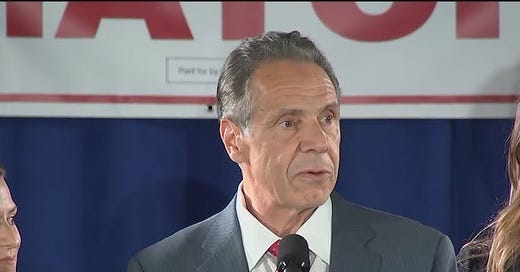How Moderates Got Stuck With Cuomo
An Exhausted, Disengaged Base Defaulted To The Guy They Knew
Tuesday’s Democratic primary for New York City Mayor was not ideal for Democrats who want to promote a more moderate image of the party nationally after Donald Trump’s reelection last November.
Assemblyman Zohran Mamdani of Queens, a progressive who has identified in the past as a socialist and expressed support for the Palestinian cause, defeated former Gov. Andrew Cuomo in the Democratic primary for mayor. It was a shocking upset in a city whose Democratic electorate is much less friendly to progressives than in other major cities.1
Mamdani, unlike other leftists like Rep. Alexandra Ocasio-Cortez, did not win thanks to low turnout either. At least one million people voted in Tuesday’s primary, likely to be the highest turnout for a Democratic primary for mayor since 1989. When the lower candidates are eliminated, voters’ rankings will likely push Mamdani above 500,000 votes, which is nearly 25 percent more than any progressive candidate received in a citywide primary.
Polls for months had shown Cuomo with a comfortable, though dwindling, lead. How did he manage to blow the race so terribly?
To put it plainly, Cuomo is a bad candidate and a bad campaigner. He always was. His successful gubernatorial runs were primarily due to the state’s Democratic lean and his opponents' weaknesses. He left office in 2021 amid a scandal that brought considerable baggage into this race. At a time when Democrats are looking to turn the page on the pre-2024 party, he was a representation of the party that tried, and failed, to vanquish MAGA.
So, why did the Democratic establishment and prominent party leaders support Cuomo in the first place? How could they not see these obvious weaknesses?
In conversations with party insiders since March, it has become clear that many did recognize his weakness, but the party’s moderate and loyal voting base convinced them that he was stronger than he is. Many establishment Democrats didn’t trust their instincts that Cuomo’s support was as thin as rice paper. They believed that after Trump’s victory, despite all his baggage, voters were dismissing the sexual assault allegations against Cuomo and embracing his comeback in the same way voters had Trump. Rather than fight it, they embraced it.
While that might have been true in February when the campaign first began, it turned out to be shortsighted, and as a result, New York’s faltering Democratic establishment is left with a huge black eye.
Keep reading with a 7-day free trial
Subscribe to Nick Rafter Writes to keep reading this post and get 7 days of free access to the full post archives.





